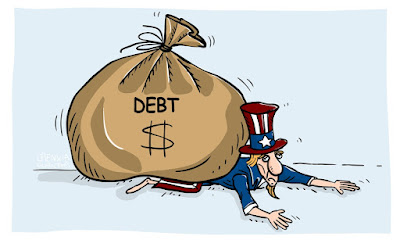In late December or early January, pundits and commentators make predictions for the new year. This year, I’m going to join in that tradition from my home on Lake Mary in Southern Mississippi.
I’m making three predictions for 2024. I’m also sharing three premonitions about the coming year. I feel certain that my 2024 predictions will come true. I hope my premonitions will not come true, but I fear they will.
Prediction number one: Joe Biden won’t be the Democratic nominee for President in 2024.
I agree with James Howard Kunstler that Joe Biden will not be on the ballot for the presidential election in November. Biden will participate in most primaries, and he will easily collect enough delegates to capture the Democratic Party’s 2024 presidential nomination, but someonne else will be the Democratic Party's nominee.
As Kunstler has suggested, I think Biden will disclose that he has a serious medical condition sometime next summer. For the good of the country, he will say, he is stepping down from the presidential race and releasing his delegates to someone else.
Who will that person be? I don’t know and you don’t know, but someone living on Martha’s Vineyard knows. The Democratic nominee won’t be a person who participated in the Democratic primaries. After Biden steps aside, the Democratic Party’s Super Delegates will nominate someone who skipped the primaries. Credible speculation says it will be Michelle Obama.
The mainstream media pretends that Biden is a serious candidate for another term as President, but no one believes that. His declining health is evident to everyone. Biden has some sort of cognitive disability, which is steadily getting worse.
Moreover, the Republicans are finding evidence that the Biden family took bribes from foreign countries and stashed the money in offshore bank accounts. If substantiated, those charges could led to an impeahment trial during Biden's second term.
I think Biden will pardon himself and his entire family (including his grandchildren) before leaving office. He will then shuffle off the world stage and live the remainder of his days in an opulent and secure memory care facility.
Prediction number two: Donald Trump will be the Republican nominee for President in November.
Within weeks, the Supreme Court will overrule decisions by various state officials to keep Trump off the presidential ballot for allegedly participating in an insurrection. You can take that to the bank.
Trump is also facing criminal charges in various jurisdictions. I think he will beat those charges. Alternatively, any convictions against him will be overturned by the appellate courts.
Thus, Trump will be the Republican nominee for president, and he will face an opponent chosen by the Democratic Party’s Super Delegates.
Prediction number three: Americans will regret our involvement in the Ukraine war.
Ukraine is losing its war with Russia. It will never regain the Donbas or reoccupy Crimea. Meanwhile, the NATO countries are more and more ambivalent about their support for Ukraine. Russia has the stamina for siege warfare and prolonged fighting. The western nations do not.
Eventually, Ukraine and Russia must reach a settlement, and that settlement will require Ukraine to give up some territory. The longer the West waits before coming to that conclusion, the more people will die in this foolish and unnecessary war.
Now here are my premonitions for 2024—premonitions I hope will not come to pass.
Premonition number one: Urban violence. I fear an outbreak of violence in our cities during the summer of 2024, which will peak during the Republican and Democratic Party conventions. I also fear anti-Israel protests will become larger and more disruptive and will invite more violence.
Premonition number two. Rampant inflation. In spite of our government’s effort to deceive the American people, inflation in this country is out of control and is getting worse. In particular, the rising cost of food and housing will cause millions of Americans to suffer before the year is out.
Premonition number three: Terrorists will cross our southern border and kill hundreds of Americans.
Illegal immigrants are entering the United States at the rate of 10,000 people a day, and they are not all coming from Latin America. A significant number of border crossers come from the Middle East and some are on the government’s Terrorist Watch List. No nation can absorb those numbers indefinitely without endangering its sovereignty.
2024 may be the year in which PresidentJoe Biden's insane boder policy enables terrorists to cross our southern border and commit a wanton and spectacular act of murder. I hope not.
Conclusion
I hope 2024 will be the year when Americans take prudent steps to protect our security, our culture, and our way of life. I hope this is the year Americans will stop electing crooks and madmen to public office and quit sending their children to universities that promote racism.
I fear, however, that America will continue along its downward path toward financial and social collapse. If Americans don’t do something this year to remove the crooks from public office, reform our education system, and get our financial house in order, the days of American greatness will be over.
 |
| Maine Secretary of State Shenna Bellows: Preventing the wrong people from running for President |
















